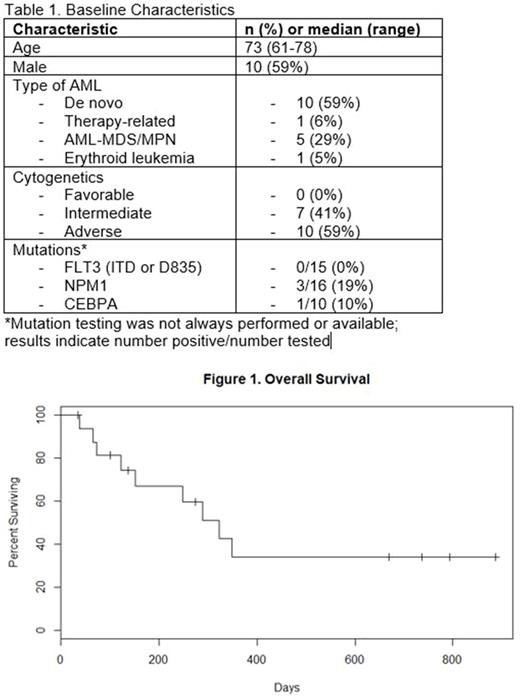Abstract
Introduction: Outcomes of acute myeloid leukemia (AML) in older patients remain unsatisfactory with low rates of complete remission (CR), disease-free survival (DFS), and overall survival (OS). Microtransplantation - in which allogeneic cells are infused without substantial engraftment (<2% donor cell engraftment) - has the potential to improve anti-tumor immunity without the risks of allogeneic hematopoietic stem cell transplant and graft-vs-host disease (GVHD).
Methods: Adapting the protocol of Ai et al. (Blood 2011;117(3):936-41), newly diagnosed high-risk AML patients ≥ 55 years received induction with cytarabine100 mg/m2, idarubicin 12 mg/m2, and microtransplantation (7+3+MST). Microtransplantation was given 24-48 hours after 7+3 and consisted of a G-CSF mobilized leukapheresis product from a HLA-haploidentical family donor; a minimum of 1x108 CD3+ cells/kg were infused. Subjects in CR received 2 cycles of consolidation with high dose cytarabine (HiDAC); the second cycle was followed by another MST. Subjects not in CR were allowed to undergo a 2nd repeat induction cycle (7+3+MST).
Results:We enrolled seventeen patients (Table 1) with a median of 248 days of follow up (range 37-887). The median age was 73 years (range 61-78); 5 (29%) had an antecedent hematologic disorder, and 10 (59%) had adverse-risk cytogenetics. Overall, 12 (71%) had poor-risk AML defined as either therapy-related AML, antecedent hematologic disorder, or adverse-risk cytogenetics; 2 (12%) had intermediate-risk AML, and 3 (18%) had favorable-risk AML (all three NPM1 positive).
One patient developed sepsis during induction and did not receive microtransplantation; of the other sixteen patients that received at least one round of 7+3+MST, 10 (62.5%) achieved a complete remission, including 4 of 4 patients with intermediate or favorable risk AML (100%) and 6 of 12 with poor-risk AML (50%). Of the 10 in CR, 9 achieved CR after one round of induction and one required a second induction. Nine completed consolidation while one stopped after the first cycle of consolidation due to deconditioning. Three (19%) remain disease-free and alive at 100, 274, and 737 days. Interestingly, all three of these patients had fevers/chills during or immediately after MST. There were no further complications with MST, no cases of treatment-related mortality, and no cases of GVHD, consistent with absence of substantial engraftment. Estimated survival at six months was 67% and at one year was 34% (Figure 1). Correlative studies of immunomodulatory effects, including T-cell exhaustion and NK cell function, depth of response (minimal residual disease), and persistence of donor cells (microchimerism) are pending to better understand the potential mechanisms by which microtransplantation may improve disease responses.
Conclusion: Microtransplantation is a potentially safe and effective therapy for older patients with AML. High rates of complete remission were observed in both those with favorable/intermediate risk disease as well as those with poor-risk disease. Further studies are warranted into the efficacy and mechanisms of microtransplantation.
Sung: Novartis: Research Funding; Merck: Research Funding; Cellective: Research Funding. LeBlanc: Seattle Genetics: Research Funding; Helsinn Therapeutics: Consultancy, Honoraria; Boehringer Ingelheim: Membership on an entity's Board of Directors or advisory committees; Otsuka: Membership on an entity's Board of Directors or advisory committees; Janssen: Honoraria; Pfizer: Consultancy; AstraZeneca: Research Funding; American Cancer Society: Research Funding; Celgene: Honoraria; Cambia Health Foundation: Research Funding; Flatiron Health: Consultancy. Brander: Teva Pharmaceuticals, Genentech, AbbVie, Pharmacyclics: Consultancy; TG Therapeutics: Consultancy, Membership on an entity's Board of Directors or advisory committees; Genentech: Consultancy; AbbVie: Consultancy, Membership on an entity's Board of Directors or advisory committees. McKinney: Kite Pharma: Other: advisory comittee. Sipkins: Gilead Sciences, Inc.: Research Funding. Rizzieri: Shire: Research Funding; Erytech: Research Funding.
Author notes
Asterisk with author names denotes non-ASH members.


This feature is available to Subscribers Only
Sign In or Create an Account Close Modal